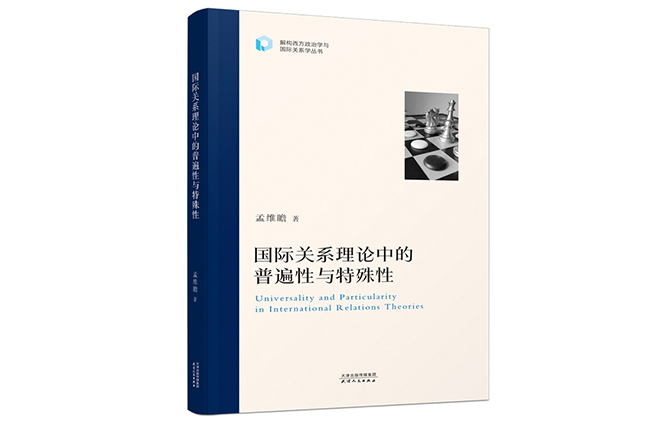International relations theory with Chinese characteristics

FILE PHOTO: The cover of Universality and Particularity in International Relations Theories by Meng Weizhan, published in 2023
In the past few decades, the innovation of China’s distinctive theory of international relations can be divided into two implementation paths: the universal path and the specific path. Both are integral to the construction of an independent knowledge system in the field of international relations by Chinese scholars.
Non-contradiction
Towards the end of the 20th century, Chinese scholars put forth the idea of developing an international relations theory that would reflect the distinctiveness of China’s historical background. This proposal arose from the realization that existing theories from Western countries were insufficient in capturing China’s unique experiences. The specific and universal paths of Chinese international relations theory emerged almost in the same period, promoting and complementing each other.
Theories built upon the universal path focus on the commonalities between China and other countries. Since the end of the 20th century, many pioneers in China’s international relations theory have sought to construct original grand theories. By the mid-2000s, the Chinese field of international relations had witnessed the emergence of numerous schools of thoughts. Among the most well-known are moral realism, social evolution of international politics, harmony and coexistence, and positional realism.
Others Chinese scholars have developed universal theories with Chinese characteristics based on alliance theory, the English School of international relations theory, and critical theory. These scholars engage in academic dialogues with overseas counterparts, publish academic papers in English, and have even founded English academic journals. As a result, these scholars have gained considerable influence on a global scale, effectively amplifying their voice within the international academic community.
Theories built upon the specific path do not give up the search for commonalities between China and other countries, but they do emphasize the discovery of China’s unique attributes in order to provide a way to understand the world differently from the Western perspective.
Specifically, the uniqueness of Chinese culture and civilization suggests that China’s political system cannot necessarily mirror those of other countries. The uniqueness of the Chinese mindset has informed China’s distinctive diplomatic decision-making and foreign policies. The uniqueness of Chinese historical traditions and political practices indicate that the rise of China could potentially influence the existing international order and norms.
Dialectical relationship
The universal path and the specific path are not distinct from each other. The experience of a country’s rise is both universal and specific. Historically, many Western countries rose through colonial expansion and capital accumulation. Today, China is in the midst of exploring a brand-new path no country has ever taken before.
It is important to adhere to a dialectical perspective when exploring specific phenomena in international relations and world politics. On one hand, the apparent differences between China and the West do not mean that China is absolutely unique, because these differences can potentially be explained by existing Western theories. In this case, it is advisable to apply established theories to explain Chinese issues, and blindly pursuing theoretical innovation could result in empty slogans.
On the other hand, even if all Western theories fail to explain certain phenomena in China, Chinese scholars should still prioritize the development of universal theories, considering different countries as different cases within a universal framework. While endowed with distinct Chinese characteristics, such theories can also constitute part of the collective efforts of the global academic community.
It is relatively easier for theories built upon the universal path to gain recognition within the Western academic community of international relations. However, the deep-seated contradictions between Eastern and Western countries today cannot be explained if this reality is evaded, if we ignore the fact that China’s historical traditions, population size, the Chinese strategic thinking and understanding of the world order differ greatly from the West.
Whether they adopt the universal path or the specific path, Chinese scholars of international relations must engage in essential dialogues with their overseas counterparts. We should neither deny the existence of specificity in various aspects of international relations, nor give up the pursuit of universality.
Meng Weizhan is a lecturer at the Fudan Institute for Advanced Study in Social Sciences. Lu Lu is from the University of Nottingham.
Edited by WANG YOURAN

 PRINT
PRINT CLOSE
CLOSE